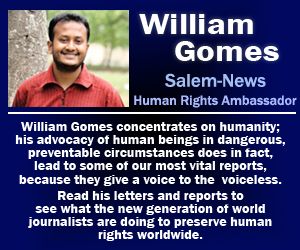
Publisher:
Bonnie King
CONTACT:
Newsroom@Salem-news.com
Advertising:
Adsales@Salem-news.com

~Truth~
~Justice~
~Peace~
TJP
Jul-12-2012 10:49

 TweetFollow @OregonNews
TweetFollow @OregonNews
Massachusetts: Protect Children With Disabilities
Letter by William Gomes Salem-News.comUS state allows torturous electric shocking of children, the practice is even banned today in China.
.jpg) From the article: 'Educator Pushes For End Of Child Electric Shock Treatments' by Nocturnal Penstrokes |
(BOSTON / SALEM) - The Salem Witch Trials are a sad testimony to the many limitations of man's ability to think and reason and act fair and just.
 |
Those trials happened 320 years ago, but the spirit that accompanied them in Massachusetts appears to be alive and well.
The Judge Rotenberg Center (JRC), is a modern day institution that utilizes electric shock treatment; like something from a very bad movie. In 2012, JRC uses mechanisms that were long ago abandoned in the treatment of human beings, particularly those with the least ability to advocate for themselves; the vulnerable disabled population which is often nearly voiceless.
Anywhere else in the United States, in any medical facility, school, detention facility, jail, or prison, their practices would never be allowed.
This amount to torture; the procedure being used here is a cruel, inhumane, and degrading treatment that violates the inherent dignity of every person with a disability at JRC who receives the shocks.
| “ |
The Honorable Stephen Brewer I am William Nicholas Gomes, Human Rights Ambassador for Salem-News.com. I have been informed that Human Rights watch wrote in support of Amendment 548 (Regulating Treatment of Disabled Persons) in the proposed Massachusetts state budget, which would put an end to the practice of administering electric shocks as behavior modification to all people with disabilities in Massachusetts. I have been informed that this pratice, which is used only at the Judge Rotenberg Center in Canton, MA, fails to respect the dignity of individuals with disabilities and is tantamount to torture. In this regard the human rights watch wrote to you , I do agree the issues raised on the issues and I follow the issues and I am wiring to express my support for the inclusion of Amendment 548 (Regulating Treatment of Disabled Persons) in the proposed Massachusetts state budget. This amendment would put an end to the practice of administering electric shocks as behavior modification (including when used to punish behavior) to all people (including children) with disabilities in Massachusetts, a practice that fails to respect the dignity of individuals with disabilities and is tantamount to torture. I note that the current international standard describes persons with disabilities as “those who have long-term physical, mental, intellectual or sensory impairments which in interaction with various barriers may hinder their full and effective participation in society on an equal basis with others.”[1] As you know, subjecting children with disabilities to electric shock in order to punish their behavior is used in only one facility in the United States: the Judge Rotenberg Center (JRC) in Canton, MA. JRC refers to this practice as “aversive therapy.” With the approval of a patient’s parent and a state court, JRC can apply “skin shocks” in response to perceived negative behavior by the child. These shocks, according to the JRC website, last two seconds and are applied “to the surface of the skin, usually on the arm or leg.” Shocks, according to JRC, are applied to about 42 percent of school-age children in their care, an average of once per week. Children as young as nine years old can receive these shocks. JRC’s description of the limited nature of this procedure is contradicted by various press accounts and by video evidence posted online of the extreme use of shock therapy on Andre McCollins. In 2002 McCollins, who was 18 at the time, was restrained and shocked over 30 times after refusing to take off his coat. In the video, according to one press account, McCollins can be seen “writhing in agony and screaming to be saved.”[2] One lawmaker who volunteered to receive the shocks described them as “horrendously painful.”[3] A reporter who also volunteered for the shocks described the feeling as “a horde of wasps attacking me all at once.”[4] Any use of physical force as punishment “intended to cause some degree of pain or discomfort” is seen by the UN Committee on the Rights of the Child as corporal punishment under international law, and has been “qualified by all relevant intergovernmental human rights monitoring bodies as cruel, inhuman or degrading punishment … [and] can no longer be justified, not even under the most exceptional situations.”[5] Few rights are as fundamental as the right to be free from torture and cruel, inhuman, or degrading treatment. This right can be found in most major international human rights treaties, including the International Covenant on Civil and Political Rights and the Convention against Torture, both ratified by the US. The right to not be tortured or to be subjected to cruel, inhuman, or degrading treatment is also expressly stated in the Convention on the Rights of Persons with Disabilities—which is before the US Senate for its advice and consent—and included in the Convention on the Rights of the Child, which the US signed in 1995. The JRC disputes that the practice of shocking children with disabilities is a form of torture, framing the practice as a therapeutic intervention. Yet according to experts on international human rights law, the absence of consent of the child and the child’s powerlessness, combined with the purposeful infliction of physical pain to punish the child, meet the criteria for torture.[6] The JRC also cites parental support for the treatment as an additional rationale for its use of aversive treatment. Yet under international human rights law, parental consent does not absolve states from their obligation to protect children with disabilities from torture and cruel, inhuman, and degrading treatment. No consent can justify such treatment. The practices at JRC amount to torture or cruel, inhuman, and degrading treatment, and they violate the inherent dignity of every person with a disability at JRC who receives the shocks. The Judge Rotenberg Center is an aberration; the practices in this school are unallowable—even unfathomable—anywhere else in the United States, in any medical facility, school, detention facility, jail, or prison. Massachusetts must put an end to this barbaric practice. We therefore urge you to incorporate Amendment 548 into the proposed budget and protect persons with disabilities in your state from further harm. Sincerely, William Nicholas Gomes Human Rights Ambassador for Salem-News.com
cc: The Honorable Brian Joyce
[1] Convention on the Rights of Persons with Disabilities (CRPD), adopted December 13, 2006, G.A. Res. 61/106, Annex I, U.N.GAOR, 61st Sess., Supp. (No. 49) at 65, U.N. Doc. A/61/49 (2006), entered into force May 3, 2008, art. 1. The United States signed the CRPD in 2009 but has not ratified. To date, 153 countries have signed the treaty and 115 have ratified. [2] Martin Robinson, “‘Tortured, terrorised and abused’: Shocking new video shows disabled boy strapped down and shocked 31 times at school by his own laughing teachers for seven hours,” The Daily Mail (UK), April 12, 2012, http://www.dailymail.co.uk/ [3] Tom Benner, “Canton school head: Shocking students is safe; Lawmakers discuss restricting use of ‘aversive therapy’ at Rotenberg Center,” The Patriot Ledger, January 16, 2012, http://www.arcmass.org/ [4] Maia Szalavitz, “‘Shock’ School Trial: Where Is the Evidence that Abuse Helps Treat Autism?” Time, April 23, 2012, http://healthland.time.com/ [5] UN Human Rights Council, Report of the Special Rapporteur on Torture and Other Cruel, Inhuman or Degrading Treatment or Punishment, Manfred Nowak,January 14, 2009, A/HRC/10/44, http://www.unhcr.org/cgi-bin/ [6] Convention against Torture and Other Cruel, Inhuman or Degrading Treatment or Punishment (Convention against Torture), adopted December 10, 1984, G.A. res. 39/46, annex, 39 U.N. GAOR Supp. (No. 51) at 197, U.N. Doc. A/39/51 (1984), entered into force June 26, 1987, ratified by the United States on October 21, 1994, art. 1. |
” |

Salem-News.com Human Rights Ambassador William Nicholas Gomes is a Bangladeshi journalist, human rights activist and author was born on 25 December, 1985 in Dhaka. As an investigative journalist he wrote widely for leading European and Asian media outlets.
He is also active in advocating for free and independent media and journalists’ rights, and is part of the free media movement, Global Independent Media Center – an activist media network for the creation of radical, accurate, and passionate telling of the truth. He worked for Italian news agency Asianews.it from year 2009 to 2011, on that time he was accredited as a free lance journalist by the press information department of Bangladesh. During this time he has reported a notable numbers of reports for the news agency which were translated into Chinese and Italian and quoted by notable number of new outlets all over the world.He, ideologically, identifies himself deeply attached with anarchism. His political views are often characterized as “leftist” or “left-wing,” and he has described himself as an individualist anarchist.
-------------------------------
Tweet
Follow @OregonNews
 |
 |
 |
 |
 |
 |
 |
Articles for July 11, 2012 | Articles for July 12, 2012 | Articles for July 13, 2012
Quick Links
DINING
Willamette UniversityGoudy Commons Cafe
Dine on the Queen
Willamette Queen Sternwheeler
MUST SEE SALEM
Oregon Capitol ToursCapitol History Gateway
Willamette River Ride
Willamette Queen Sternwheeler
Historic Home Tours:
Deepwood Museum
The Bush House
Gaiety Hollow Garden
AUCTIONS - APPRAISALS
Auction Masters & AppraisalsCONSTRUCTION SERVICES
Roofing and ContractingSheridan, Ore.
ONLINE SHOPPING
Special Occasion DressesAdvertise with Salem-News
Contact:AdSales@Salem-News.com

googlec507860f6901db00.html



Terms of Service | Privacy Policy
All comments and messages are approved by people and self promotional links or unacceptable comments are denied.
[Return to Top]
©2025 Salem-News.com. All opinions expressed in this article are those of the author and do not necessarily reflect those of Salem-News.com.